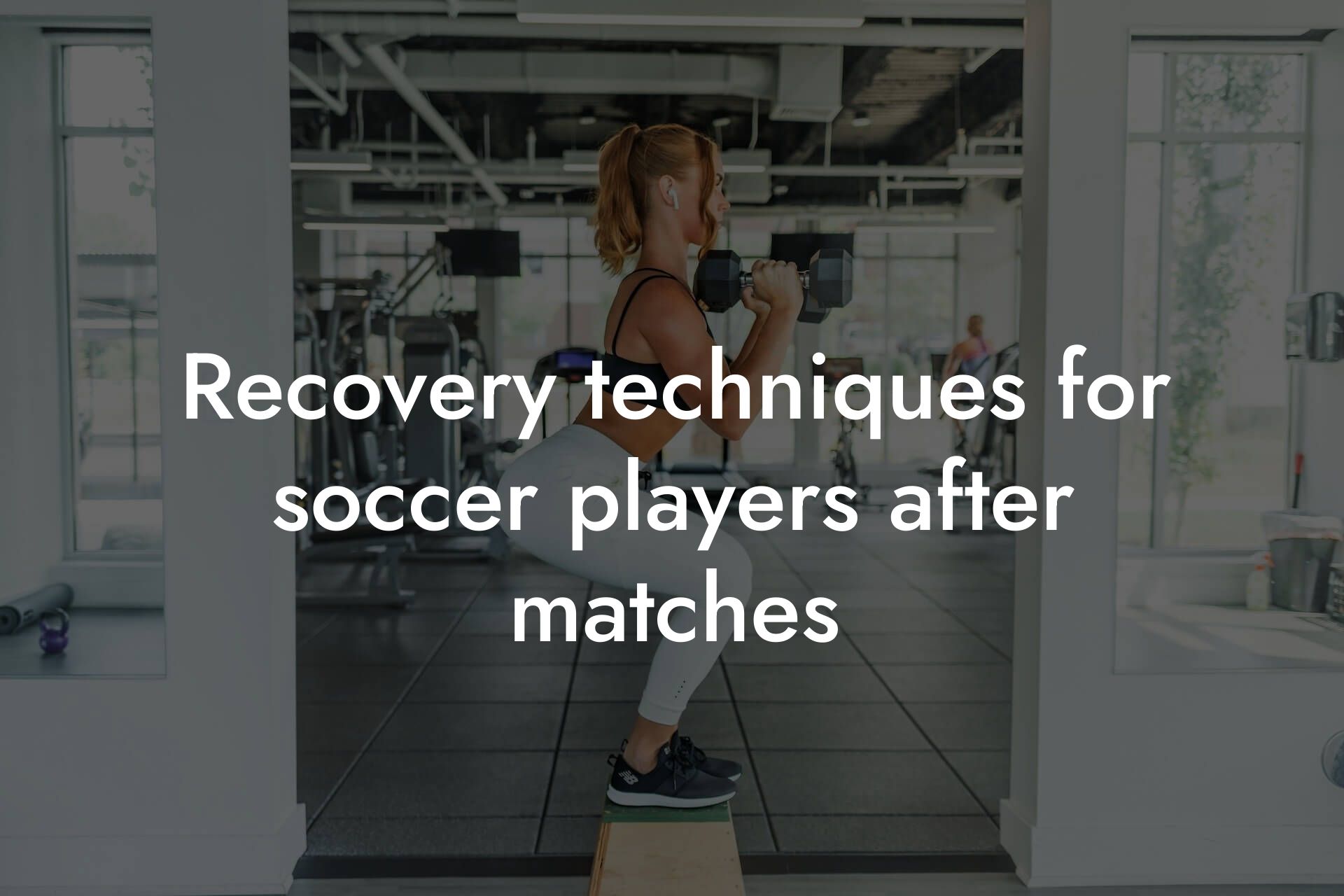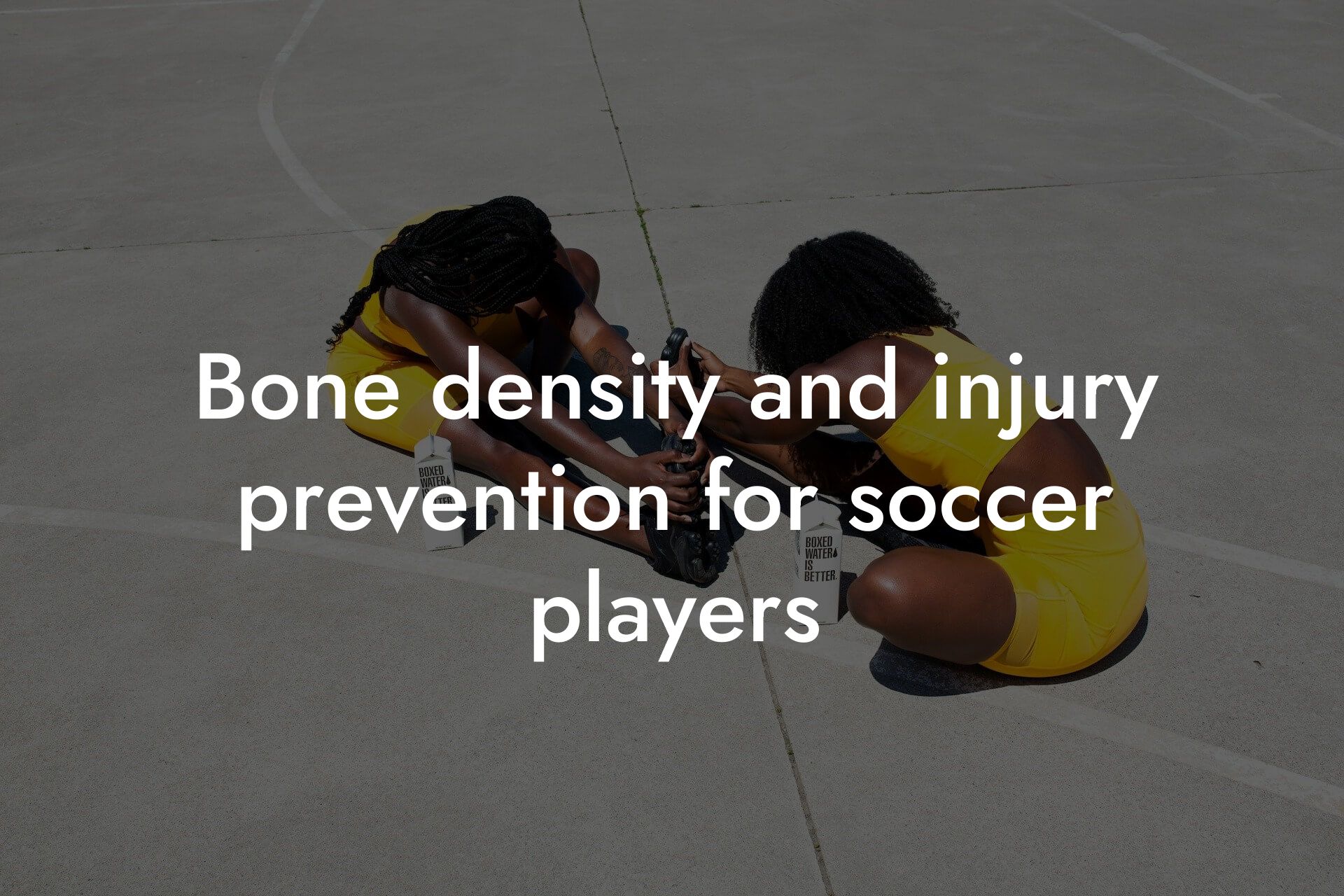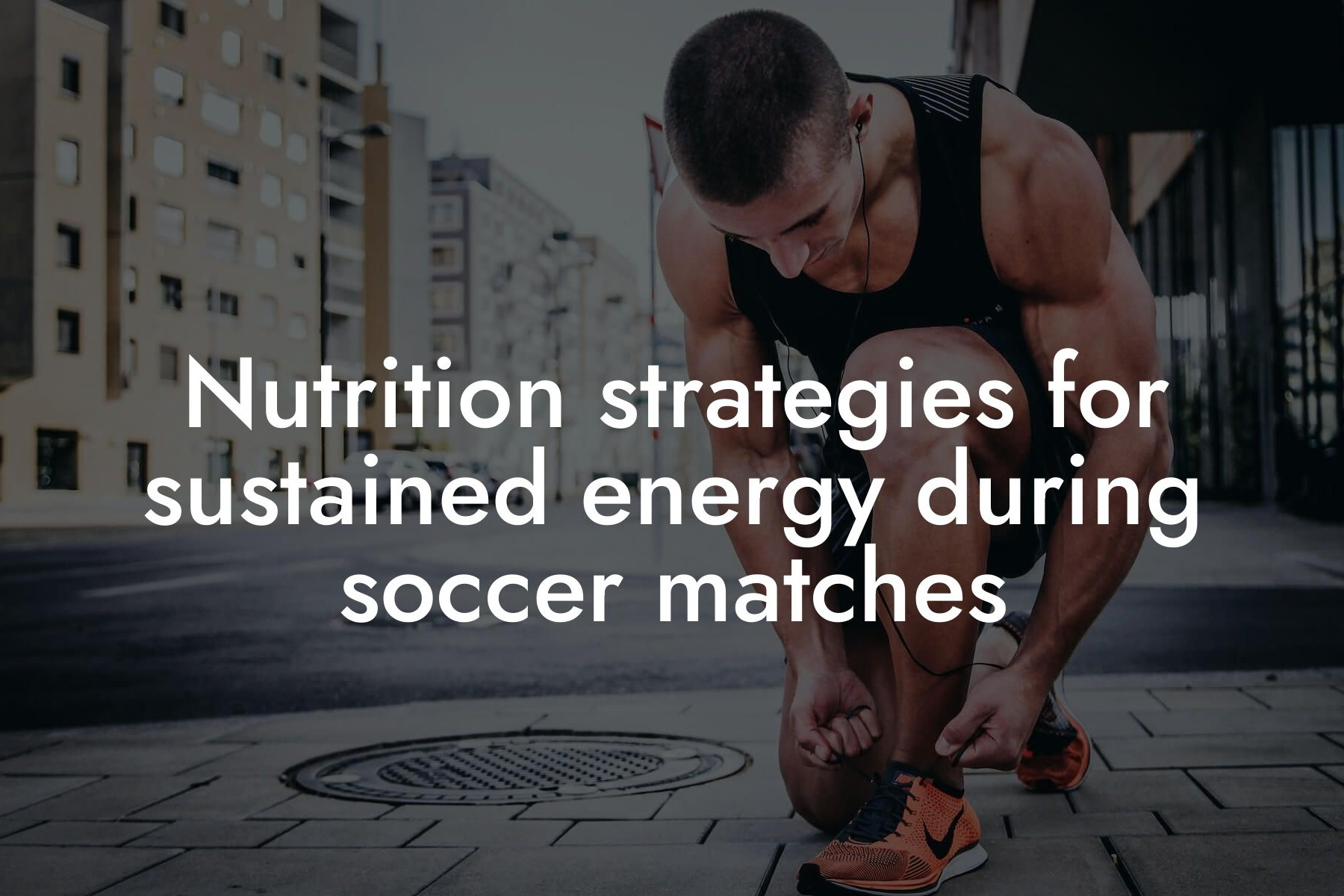As a weekend soccer warrior, you know that performing at your best on the pitch requires more than just skill and practice. Proper hydration and nutrition are essential to optimize your physical performance, reduce the risk of injury, and support overall health. At Tano Performance Group, we understand the importance of fueling your body for peak performance. In this article, we'll provide you with comprehensive hydration and nutrition tips to help you dominate the game and achieve your fitness goals.
Table of Contents
Understanding Your Body's Hydration Needs
As an athlete, you lose water and electrolytes through sweat, which can lead to dehydration if not replenished. Dehydration can impair athletic performance, causing fatigue, dizziness, and decreased endurance. To stay hydrated, it's essential to understand your individual needs. A general rule of thumb is to drink at least 8-10 glasses of water per day, but this may vary depending on your age, sex, weight, and activity level.
For weekend soccer warriors, it's recommended to drink 17-20 ounces of water 2-3 hours before playing, and 7-10 ounces every 10-15 minutes during the game. Additionally, consider incorporating electrolyte-rich drinks or snacks, such as sports drinks or bananas, to replenish lost electrolytes.
Electrolytes 101: What You Need to Know
Electrolytes are essential minerals that regulate various bodily functions, including nerve and muscle function. During exercise, you lose electrolytes through sweat, which can disrupt these functions and lead to muscle cramps, fatigue, and dizziness. The key electrolytes to focus on are:
Sodium: Helps regulate fluid balance and nerve function
Potassium: Crucial for muscle function and heart health
Calcium: Essential for muscle contraction and bone health
Magnesium: Involved in muscle function, nerve function, and energy production
To replenish electrolytes, consume electrolyte-rich foods and drinks, such as:
Sports drinks like Gatorade or Powerade
Bananas (rich in potassium)
Nuts and seeds (rich in magnesium)
Dairy products (rich in calcium)
Nutrition Tips for Optimal Performance
A well-balanced diet is essential for optimal performance on the pitch. Focus on consuming a variety of whole, nutrient-dense foods, including:
Complex carbohydrates: Whole grains, fruits, and vegetables provide energy and fiber
Lean protein: Include sources like lean meats, fish, eggs, and dairy products to support muscle growth and repair
Healthy fats: Nuts, seeds, avocados, and olive oil support energy production and overall health
Hydrating foods: Incorporate foods with high water content, such as watermelon, cucumbers, and celery, to contribute to your daily hydration needs
Pre-Game Meal Strategies
Your pre-game meal should provide energy, support hydration, and be easy to digest. Aim to eat a meal 2-3 hours before playing, consisting of:
Complex carbohydrates: Whole grain pasta, brown rice, or whole grain bread
Lean protein: Grilled chicken, fish, or turkey
Healthy fats: Nuts, seeds, or avocado
Hydrating foods: Include foods with high water content, such as watermelon or cucumbers
Example pre-game meal: Grilled chicken breast with quinoa, steamed vegetables, and a side of mixed berries
Game-Day Snacks for Energy and Hydration
During the game, it's essential to replenish energy stores and stay hydrated. Opt for snacks that are easy to digest, high in carbohydrates, and rich in electrolytes. Some examples include:
Fresh fruit: Bananas, apples, or oranges
Energy bars: Look for bars with wholesome ingredients and minimal added sugars
Trail mix: A mix of nuts, seeds, and dried fruit
Sports drinks: Consume small amounts to replenish electrolytes
Post-Game Recovery Nutrition
After the game, it's crucial to replenish energy stores, support muscle recovery, and rehydrate. Aim to consume a meal or snack within 30-60 minutes of finishing play, consisting of:
Carbohydrates: Focus on complex carbohydrates, such as whole grains, fruits, and vegetables
Protein: Include sources like lean meats, fish, eggs, or dairy products to support muscle repair
Healthy fats: Nuts, seeds, or avocado support energy production and overall health
Hydrating foods: Incorporate foods with high water content, such as watermelon or cucumbers
Example post-game meal: Grilled chicken breast with sweet potato, steamed broccoli, and a side of mixed berries
Additional Tips for Weekend Soccer Warriors
In addition to proper hydration and nutrition, consider the following tips to optimize your performance:
Get enough sleep: Aim for 7-9 hours of sleep per night to support recovery and performance
Stay flexible: Incorporate stretching and foam rolling into your routine to improve flexibility and reduce injury risk
Listen to your body: Rest and recover when needed, and don't push yourself too hard to avoid injury
Get regular body assessments: Utilize DEXA scans and other assessments to track your progress, identify areas for improvement, and optimize your training
By following these hydration and nutrition tips, you'll be well on your way to dominating the pitch and achieving your fitness goals. Remember to stay flexible, listen to your body, and get regular assessments to optimize your performance. At Tano Performance Group, we're committed to helping you take your game to the next level.
Frequently Asked Questions
What is the importance of hydration for weekend soccer warriors?
Proper hydration is crucial for weekend soccer warriors as it helps to regulate body temperature, transport nutrients and oxygen to cells, and remove waste products. Even mild dehydration can lead to decreased athletic performance, fatigue, and increased risk of injury. As a weekend soccer warrior, it's essential to stay hydrated to perform at your best and reduce the risk of dehydration-related issues.
How much water should I drink before a soccer game?
Aim to drink at least 17-20 ounces of water 2-3 hours before a soccer game, and 8-10 ounces 10-15 minutes before kickoff. This allows for proper hydration and reduces the risk of dehydration during the game. Additionally, monitor your urine output and color – if it's dark yellow or you're not urinating frequently enough, it may be a sign that you're not drinking enough water.
What are the best foods to eat before a soccer game?
Focus on consuming complex carbohydrates, lean protein, and healthy fats 2-3 hours before a soccer game. Examples of ideal pre-game foods include whole grain toast with avocado and eggs, oatmeal with banana and almond butter, or grilled chicken with quinoa and steamed vegetables. Avoid heavy meals, sugary snacks, and caffeine, which can cause energy crashes and stomach upset during the game.
What are some healthy snack options for halftime?
Opt for snacks that are high in carbohydrates and electrolytes, such as bananas, dates, energy bars, or trail mix with nuts and dried fruits. Avoid snacks high in sugar, salt, and unhealthy fats, which can cause energy crashes and stomach upset. Aim for snacks that are easy to digest and can be consumed quickly to provide a quick energy boost.
How can I prevent muscle cramps during a soccer game?
Muscle cramps can be prevented by staying hydrated, consuming electrolyte-rich foods and drinks, and maintaining adequate levels of sodium, potassium, and magnesium. Consider adding electrolyte tablets or coconut water to your hydration routine, and consume foods rich in these essential minerals, such as bananas, avocados, and dark leafy greens.
What is the best way to rehydrate after a soccer game?
After a soccer game, aim to consume 16-24 ounces of fluid for every pound of body weight lost during the game. This can include water, sports drinks, or coconut water. Additionally, consume a meal or snack that includes carbohydrates and protein within 30-60 minutes after the game to help with recovery and muscle repair.
How can I reduce muscle soreness after a soccer game?
Muscle soreness can be reduced by incorporating recovery techniques, such as foam rolling, stretching, and self-myofascial release. Additionally, consume anti-inflammatory foods and supplements, such as omega-3 fatty acids, turmeric, and ginger, which can help reduce muscle inflammation and soreness.
What are some common hydration mistakes that weekend soccer warriors make?
Common hydration mistakes include not drinking enough water, relying on sports drinks for hydration, and not monitoring urine output and color. Additionally, many weekend soccer warriors fail to adjust their hydration routine based on weather conditions, leading to dehydration and heat-related illnesses.
How can I stay motivated to prioritize hydration and nutrition?
Stay motivated by setting specific, measurable, and achievable goals, such as improving your game performance or reducing body fat percentage. Additionally, find a workout buddy or join a soccer team to increase accountability and motivation. Celebrate small victories and reward yourself for making healthy choices to stay motivated and focused.
What are some healthy meal options for weekend soccer warriors?
Healthy meal options for weekend soccer warriors include grilled chicken or fish with quinoa and steamed vegetables, whole grain pasta with lean ground beef and marinara sauce, or stir-fries with lean protein, mixed vegetables, and brown rice. Aim for meals that are high in protein, complex carbohydrates, and healthy fats to support muscle growth and recovery.
How can I incorporate healthy fats into my diet?
Incorporate healthy fats into your diet by consuming foods rich in omega-3 fatty acids, such as salmon, walnuts, and chia seeds. Additionally, add avocado, nuts, and seeds to your meals and snacks to increase healthy fat intake. Healthy fats support hormone production, reduce inflammation, and provide sustained energy.
What are some common nutrition mistakes that weekend soccer warriors make?
Common nutrition mistakes include consuming high amounts of sugar, salt, and unhealthy fats, which can lead to energy crashes, decreased athletic performance, and increased risk of chronic diseases. Additionally, many weekend soccer warriors fail to consume enough protein, complex carbohydrates, and healthy fats, leading to muscle loss and decreased recovery.
How can I stay hydrated during long soccer tournaments?
Stay hydrated during long soccer tournaments by consuming water and electrolyte-rich drinks regularly, aiming to drink at least 8-10 ounces of fluid every 10-15 minutes. Additionally, consume snacks and meals that are high in electrolytes, such as bananas, dates, and trail mix with nuts and dried fruits.
What are some healthy protein sources for weekend soccer warriors?
Healthy protein sources for weekend soccer warriors include lean meats, such as chicken, turkey, and fish, as well as plant-based options, such as beans, lentils, and tofu. Additionally, consider adding protein powder supplements to your diet, such as whey or casein protein, to support muscle growth and recovery.
How can I reduce inflammation after a soccer game?
Reduce inflammation after a soccer game by consuming anti-inflammatory foods and supplements, such as omega-3 fatty acids, turmeric, and ginger. Additionally, incorporate recovery techniques, such as foam rolling, stretching, and self-myofascial release, to reduce muscle inflammation and soreness.
What are some healthy carbohydrate sources for weekend soccer warriors?
Healthy carbohydrate sources for weekend soccer warriors include whole grains, such as brown rice, quinoa, and whole wheat, as well as fruits and vegetables, such as bananas, apples, and sweet potatoes. Aim to consume complex carbohydrates that are high in fiber and low in added sugars.
How can I prioritize sleep and recovery for optimal performance?
Prioritize sleep and recovery by aiming for 7-9 hours of sleep each night, and taking rest days as needed. Additionally, incorporate recovery techniques, such as stretching, foam rolling, and self-myofascial release, to reduce muscle soreness and improve recovery. Aim to take breaks and rest during the day to reduce fatigue and improve performance.
What are some common mistakes that weekend soccer warriors make when it comes to recovery?
Common mistakes that weekend soccer warriors make when it comes to recovery include not prioritizing sleep, not taking rest days, and not incorporating recovery techniques, such as stretching and foam rolling. Additionally, many weekend soccer warriors fail to consume adequate amounts of protein and complex carbohydrates after a game, leading to decreased muscle recovery and growth.
How can I stay motivated to prioritize my physical health and appearance?
Stay motivated by setting specific, measurable, and achievable goals, such as improving your body fat percentage or increasing your muscle mass. Additionally, find a workout buddy or join a fitness community to increase accountability and motivation. Celebrate small victories and reward yourself for making healthy choices to stay motivated and focused.
What are some healthy bone density-building foods for weekend soccer warriors?
Healthy bone density-building foods for weekend soccer warriors include calcium-rich foods, such as dairy products, leafy greens, and fortified plant-based milk, as well as vitamin D-rich foods, such as fatty fish, egg yolks, and fortified cereals. Aim to consume a balanced diet that includes a variety of bone density-building foods to support optimal bone health.
How can I reduce my body fat percentage as a weekend soccer warrior?
Reduce your body fat percentage by creating a calorie deficit through a combination of diet and exercise. Aim to consume a balanced diet that is high in protein, complex carbohydrates, and healthy fats, and low in added sugars, salt, and unhealthy fats. Additionally, incorporate high-intensity interval training (HIIT) and strength training exercises to increase muscle mass and metabolism.
What are some common mistakes that weekend soccer warriors make when it comes to nutrition?
Common mistakes that weekend soccer warriors make when it comes to nutrition include consuming high amounts of sugar, salt, and unhealthy fats, which can lead to energy crashes, decreased athletic performance, and increased risk of chronic diseases. Additionally, many weekend soccer warriors fail to consume enough protein, complex carbohydrates, and healthy fats, leading to muscle loss and decreased recovery.
Here are some related articles you might love...
- Recovery techniques for soccer players after matches
- Bone density and injury prevention for soccer players
- Nutrition strategies for sustained energy during soccer matches
- Using DEXA scans to monitor soccer player progress
- Strength training programs for amateur soccer players
- The impact of body composition on soccer performance
- Off-season conditioning for amateur soccer athletes
- Reducing body fat to enhance agility and speed in soccer
Zak Faulkner
Zak Faulkner is a leading authority in the realm of physical health and body composition analysis, with over 15 years of experience helping professionals optimise their fitness and well-being. As one the experts behind Tano Performance Group, Zak has dedicated his career to providing in-depth, science-backed insights that empower clients to elevate their physical performance and overall health.
With extensive knowledge of DEXA technology, Zak specializes in delivering comprehensive body assessments that offer precise data on body fat, muscle mass, bone density, and overall physique. His expertise enables individuals to make informed decisions and achieve their fitness goals with accuracy and confidence. Zak’s approach is rooted in a deep understanding of human physiology, combined with a passion for helping clients unlock their full potential through personalised strategies.
Over the years, Zak has earned a reputation for his commitment to excellence, precision, and client-focused service. His guidance is trusted by top professionals who demand the best when it comes to their health. Whether advising on fitness programs, nutritional strategies, or long-term wellness plans, Zak Faulkner’s insights are a valuable resource for anyone serious about taking their health and fitness to the next level.
At Tano Performance Group, Zak continues to lead our Content Team revolutionising how professionals approach their physical health, offering unparalleled expertise that drives real results.




